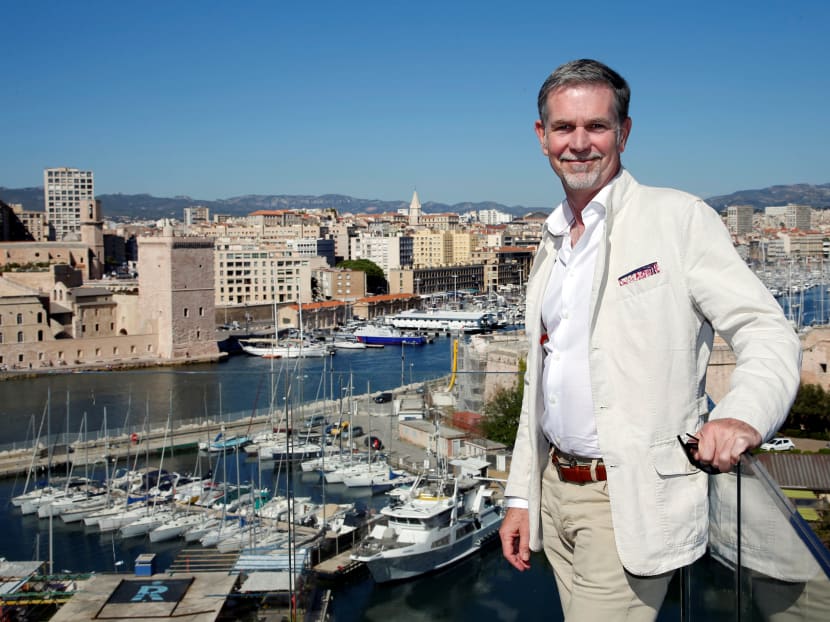Netflix, Amazon Prime face content and investment quotas in Europe
LOS ANGELES — Netflix, Amazon Prime and other video-streaming sites in Europe look set to be subject to 20 per cent European content quotas, plus European product-investment requirements in European Union countries that demand them, under proposed new regulations unveiled on Wednesday (May 25).

Reed Hastings, co-founder and CEO of Netflix, at the French premiere of Netflix TV series Marseille in Marseille, France. Photo: Reuters
LOS ANGELES — Netflix, Amazon Prime and other video-streaming sites in Europe look set to be subject to 20 per cent European content quotas, plus European product-investment requirements in European Union countries that demand them, under proposed new regulations unveiled on Wednesday (May 25).
The proposed quotas are part of a massive overhaul of EU broadcasting regulations that aims to create a level playing field in video-on-demand services across Europe. The proposals require the approval of European lawmakers to come into effect and would update the EU’s Audiovisual Media Services Directive.
Announced in Brussels by Andrus Ansip and Gunther H Oettinger, the European Commission officials leading Europe’s drive for a more unified digital market, the proposals “oblige on-demand providers to ensure at least 20 per cent share of European content in their catalogs”, according to a commission press statement.
“The proposal also clarifies that member states are able to ask on-demand services available in their country to contribute financially to European works.”
Unchanged would be rules requiring TV broadcasters to dedicate at least half their viewing time to major types of European content.
Some will see the proposals as a victory for France. The French government and its pay-TV behemoth, the Vivendi-owned Canal Plus, have campaigned long and hard for new Over-the-Top services such as Netflix, which launched in France two years ago, to be subject to the same regulation as national VOD players.
The new regulation would pave the way for that.
Ironically, the European Commission’s new proposals align with Netflix and Amazon Prime’s core strategy of investing in European content to drive up the number of their European subscribers.
Currently, four territories — France Spain, Croatia and the Francophone region of Belgium — already have investment quotas for VOD services. These are mostly around 2% of VOD operators’ total yearly turnover, but in France, which has the strictest demands, that figure rises to 26% for movie SVOD services.
So far, Netflix, which has been based out of the Netherlands since January 2014, has not been subject to EU quotas, only Dutch rules.
But under the proposed EU-wide regulations, it could be subject to investment quotas in all the European countries it operates in.
Amazon Prime announced this month that it would launch in France. HBO has scheduled a streaming service in Spain by year’s end. It remains to be seen how many of the EU’s 28 member states will adopt investment quotas and how onerous they might prove.
Netflix’s services in the EU already boast a 21 per cent share of EU films, according to a study by the European Audiovisual Observatory cited by the European Commission on Wednesday.
To date, Netflix has ordered eight original series in Europe — four in Britain and one each in France, Italy, Germany and Spain.
It also has two co-productions in Scandinavia and multiple global early acquisitions: ITV’s Marcella and Channel 4’s Kiss Me First, as examples. It is believed to have made a slew of licensing deals on European content at Cannes.
Netflix will raise its overall content budget from more than US$5 billion (S$6.89 billion) in 2015 to more than US$6 billion in 2016, and “the piece of that dedicated to original production is growing, and in absolute terms”, Netflix CEO Reed Hastings said at the premiere of Marseille, its first French original series whose full-financing by Netflix would alone account for a significant chunk of any investment quota imposed by France.
“Our members around the world love European programming, that’s why our investment in European programming, including Netflix original titles created in Europe, is growing. We appreciate the Commission’s objective to have European production flourish, however the proposed measures won’t actually achieve that,” said Netflix’s Joris Evers, reacting to the European Commission’s proposals on Wednesday.
“We have committed hundreds of millions of euros in European productions so far, an investment that continues to grow. Our first Netflix original series created in Europe, Marseille, premiered in early May and is getting strong viewing everywhere,” he added.
The VOD quotas are likely to be welcomed by much of Europe’s content industry. “Within the logic of a level playing field, we think it’s fair that OTTs that work in Europe should contribute to the growth of the European audiovisual industry by investing in new films and original TV dramas,” said Marco Chimenz, president of the European Producers Club.
Chimenz’s major concern with the new quotas is that they establish content requirements, “regardless of the fact of if it’s recent product or old library, (which) would prompt the OTTs to accumulate old local titles just to meet the quota”.
The proposed regulations would also relax advertising restrictions for European broadcasters. There would still be an overall limit of 20 per cent of broadcasting time from 7am to 11pm, but broadcasters would be able to comply with this spread out over that time as a whole rather than by the hour.
To France’s chagrin, the new proposals do not take in social media or video-sharing platforms, such as YouTube, which may be the subject of “targeted policy measures” in the future.
“YouTube laughs, Netflix cries,” an article in the French financial daily Les Echos declared on Wednesday.
“Video platforms such as YouTube, in particular, capture a growing part of the ad cake, but escape any control in Brussels project on audiovisual material.” REUTERS








